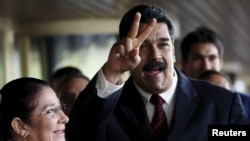Venezuelan President Nicolas Maduro on Thursday addressed a special session of the U.N. Human Rights Council in Geneva, to the outrage of international activists who had urged U.N. ambassadors to boycott the event.
Maduro arrived surrounded by a large delegation, and a group of enthusiastic supporters welcomed him. He told the crowd he had come to refute what he said were opponents' lies about the human rights situation in his country.
Speaking through an interpreter, he thanked the 43-member U.N. council for re-electing Venezuela to another three-year term on the body. He called it a "vote of confidence of the international community ... which has expressed its desire beyond manipulative and lie-based campaigns.”
Human rights activists disagreed, accusing Maduro of brutalizing dissidents and student protesters. They called for the release of opposition leader Leopoldo Lopez, who was sentenced in September to nearly 14 years in prison after what they said was a sham trial.
Zeid Ra’ad Al-Hussein, the U.N. high commissioner for human rights, also questioned the impartiality of Venezuela’s judges and prosecutors in handling politically sensitive cases, such as that of Lopez.
In a video message of welcome, the commissioner told Maduro he must take Venezuela’s recent re-election to the council seriously.
“Membership of the council comes with the responsibility to promote and protect human rights in one’s own country, but also on the global stage," Zeid said. "It is my sincere hope that Venezuela will strive to make concrete progress on both fronts.”
U.S. Mission spokesman Paul Patin called the Venezuelan president’s address a transparent attempt to use the Human Rights Council to shift attention away from his government’s repressive policies just before important national elections.
“This is an affront to a council whose sole purpose is to protect and promote human rights and fundamental freedoms," Patin said. "We thus regret that a head of state would use the council for blatant domestic political purposes as it risks damaging the credibility of this body.”
Patin said that the Venezuelan government had not fulfilled its obligations to protect the civil and political rights of its people, and that serious human rights violations continued to be committed and remained unpunished.




